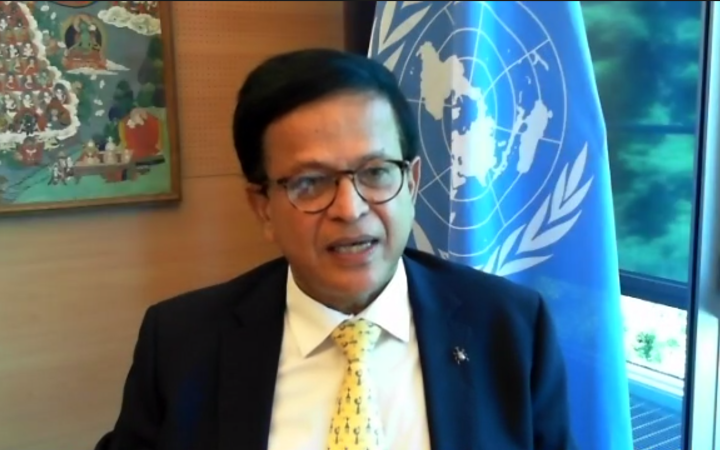10 June 2021, Hiroshima, Japan – The COVID-19 pandemic has significantly undermined progress across all 17 Sustainable Development Goals (SDGs). In fact, it remains difficult to get a complete picture of the damage wrought so far, and existing rough estimations are likely to be underestimates. However, the crisis has also served as a wake-up call for us to take action to create the world we want by 2030.
This was the central message from Nikhil Seth, United Nations Assistant Secretary-General and Executive Director of UNITAR, at an online symposium on “COVID-19’s Impact on SDGs and Future Prospects” held by Sophia University, Japan.
Seth went on to discuss the current challenges and future prospects for attaining the SDGs on a panel with Shoko Noda and Tetsuo Kondo from the UN Development Programme (UNDP), moderated by Professor Yasuhiro Ueki. The Zoom webinar was joined by 247 Sophia University students and members of the public who tuned in to explore the issue.
Seth spoke of the estimated impact of COVID-19 on each of the 17 SDGs so far, from poverty to climate change and international collaboration. For every goal, COVID-19 has intensified existing problems and deepened global inequalities. For instance, the crisis has pushed almost 132 million into chronic hunger, accelerating rises in global hunger since 2014.
“Agenda 2030 and the SDGs adopted, 6 years ago, by the United Nations in the presence of 170 presidents and prime ministers looks like a distant dream,” Seth acknowledged. Nevertheless, he also believed that COVID-19 would prompt serious actions from everyone for our people and our planet. Noting the resilience shown by communities worldwide, Seth pointed to our most urgent priority moving forward: making vaccines accessible to all.
“COVID-19 has shown… the need for a global response to ensure the health and well-being of all, especially in the developing world. But we have fallen short,” he asserted. “The need for ‘building back better’ must rejuvenate this goal.”
Concluding his speech, Seth provided a broad overview of next steps the world needs to take. He called on key stakeholders – particularly governments, cities, businesses, and industry – to adopt low-carbon, inclusive development, focused on conserving natural resources, creating new and better jobs, and tackling gender inequalities.
Seth ended with a strong call to action for all listeners to step up efforts to put technology in the service of the SDGs and the poor.
We need a movement embracing all for realizing the SDGs and the world we want by 2030.
ABOUT UNITAR HIROSHIMA
UNITAR is the only United Nations entity to establish a presence in the symbolic city of Hiroshima, in response to the desire of its people and authorities to contribute more actively to global peace and development. The Hiroshima Office has an inherent strength in the areas of peacebuilding, post-conflict reconstruction and disarmament as well as the broader themes of international peace and security. The Hiroshima Office develops and delivers focused and relevant needs-based training, including annual Fellowships and on-demand training programmes, in support of the Sustainable Development Goals, for a wide-range of beneficiaries.


